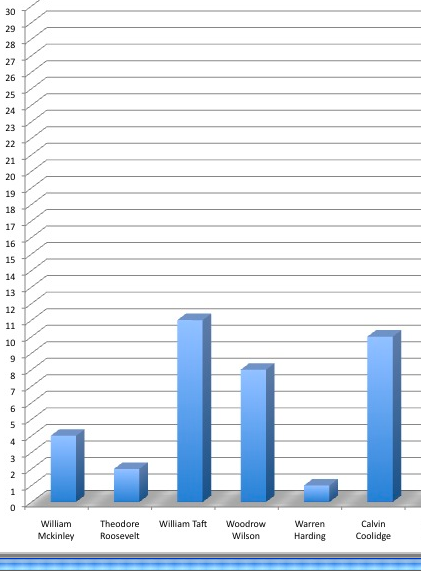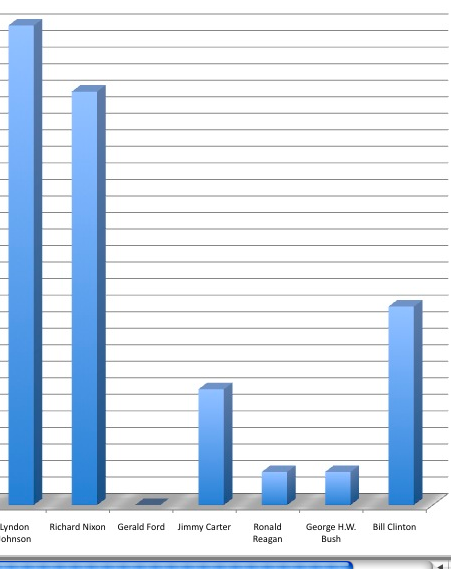City Upon A Hill
Posted on: February 26, 2009
The following graphs are used to demonstrate the number of references president’s during the 20th century made to the “City Upon a Hill” idea, particularly as described by historian Alan Brinkley in an article for the Atlantic called the The Messiah Complex. The data was compiled by Dr. Murnane’s D period history class, after reviewing presidential speeches found at the Presidential Speech Archive at the Miller Center for Public Affairs, University of Virginia. Students discussed the “ups and downs,” comparing them to a time line of U.S. History. Students then commented to this post, explaining WHY these “ups and downs” appeared over the course of the 20th century.



15 Responses to "City Upon A Hill"
The points where the references spiked were coincidently around times that America was in some sort of conflict. With Nixon and watergate, or world war 1.
The presidents around those times would use City upon a hill as a way to boost the moral of the American People. But the times after failures of presidents, the people following them would not want to follow their example and would not make many references.
Or times of relative peace where America was not involved with global or national conflict.
Throughout the graph, the ups and downs in City Upon a Hill mentions differ throughout each term. These ups and downs were caused by events that were going on overseas during the presidency. For example the high City Upon a Hill mentions were caused by major events going on overseas which the U.S. was involved in. For example, Kennedy’s numbers were high, his high numbers were caused by events such as the Cuban Missile Crisis and his involvement in Vietnam in fighting Ho Chi Minh. The low numbers were caused by events that kept the U.S. in affairs on U.S. soil. For example, Gerald Ford, in the wake of Watergate and a bad economy he was forced to keep major affairs overseas out of his presidency, he needed to focus on U.S. affairs only, keeping the American people confident in their leader, and helping the economy. Therefore he did not feel the need to mention City Upon a Hill in his speeches.
There are ups and downs in the graph because throughout the time because throughout history when war and scandals were mentioned there were more presidential speeches. Between John F. Kennedy and Richard Nixon was an explosion of “City on Hill” references. Lyndon Johnson and Richard Nixon were involved in Vietnam. Richard Nixon had so many references because of the Watergate scandal. Surprisingly Ronald Reagan to Bill Clinton was limited in references because of the Gulf War and War in the Middle East. Also with Franklin Roosevelt he only referenced 13 “City on a Hill” references. Roosevelt had 4 years in office so this was not a lot of references.
The idea of the “City Upon the Hill” has been referenced by almost all of America’s presidents. It represents the American ideal of being a leader in world affairs, and of standing as an example for the rest of the world in internal affairs and actions. The statistics of the number of times each U.S. president referenced the idea of the “City Upon a Hill” shows both dramatic upward and downward trends. For the most part, the upward trends seem to be at times when America felt the need to take control of negative events throughout the world, such as during wars. Presidents such as Lyndon B. Johnson used the idea in order to defend their rights to invade other countries in order to install American ideals in them. Johnson needed to convince Americans that invading Vietnam was a good idea, and by promoting the idea that America needed to act as a leader and teach other countries how to be “good”, he managed to convince many of America’s “superiority” and “duty” to show other countries its ways. Another reason for upward trends was when America or the world faces hard times, presidents often feel the need to inspire Americans with these kinds of speeches. Downward trends were often the result of recent American failure, which explains why Gerald Ford’s were so low afer the Richard Nixon scandal. Since Nixon had referenced the philosophy more than almost every other president, Ford did not want to appear to be similar to Nixon and did not want to try to convince America that we were superior after such an embarrassing and alarming scandal on the part of the U.S. government. The “City Upon a Hill” statistics reflect the events that America was facing at the time and the views and goals of the specific presidents giving the speeches.
The Presidential statistics relating to “City Upon a Hill” were clearly different. This of course, is in a large part due to the main events during a particular presidents time period. Presidents that were serving during large wars such as Lyndon B. Johnson and FDR were more or less likely to use a “City Upon a Hill” reference. One could also be quick to ask why are some president’s ratings particularly higher then others? One president in particular, LBJ had an actual “City Upon a Hill” set of plans. For a set time period a majority of his speeches were about him referring to these plans. This is clearly evident with the amount of times he mentioned “City Upon a Hill”. On the lower end such as FDR we see his presidency coming at the height of WW2. It is clearly tough to refer to your country as a “City Upon a Hill” while at war. You can clearly see how big events during a Presidents tenure greatly effected their mentions of “City Upon a Hill”
I believe that the graph’s increases and decreases are caused by different events going on in America at the time of presidency. The graph seems to be higher when America was in times of conflict overseas. Presidents such as Kennedy and Nixon used the phrase “city upon a hill” to boost everyone’s confidence for America during the current conflict. The low points in the graph prove that the president probably came to office after a difficult time in America. Presidents such as Gerald Ford would not want to use this phrase, because it is was a phrase that previous presidents used. The idea of “city upon a hill” was used throughout presidencies to represent the idea of America showing leadership qualities and being a powerful country.
This graph demonstrates the increases and decreases of the infamous “city upon a hill” reference to America. The U.S, believing that its democracy and freedom should be an example to other nations, refers to America as being a great nation, which in turn should be a leading example for how other nations conduct themselves. However, the use of this phrase and others like it drops and rises according to domestic and foreign changes. When the morale of the country rises and Americans feel proud of who they are, the use of it increases dramatically. For instance during the time of Linden B. Johnson, the Vietnam War was sparked. Many Americans felt that Vietnam and all other countries should follow America’s lead of democracy, and tossed around the phrase constantly. This was also in order to increase the popularity of the war, despite it being considered almost vulgar by many, mostly younger Americans. In times when the country was least proud, for example during the presidency of Gerald Ford, the country’s morale was incredibly low, due to the Watergate Scandal and the loss that took place in Vietnam. Americans refer to the “City Upon A Hill” phrase more when the country is the most proud of itself, rather than when the countries morale is low.
The graph about the “City Upon a Hill” seemed to differ with what time period the president was in and what president it was. When they’re was war going on at that particular time the president seemed to say it more because he was trying to reassure the country and show that the US is on top of everyone. It also seemed like they were trying to be more proud at the time then everyone else. Like Johnson, he was trying to prove that he could handle the war, so by doing that he would try to make the American people comfortable and trust in him. This action is similar to all the presidents before and after his time.
I believe that many presidents used “a city upon a hill” when our country was in time of need. Many presidents such as JFK or LBJ used “city upon a hill” to make our citizens believe that we are the country to be and will get out of trouble. We see Nixon used “city upon a hill” many times, but was not an honest president and could not be trusted. Gerald Ford took over after Nixon and never used “city upon a hill” because he knew that we were a country that needed help. As we see the problems our country faced decrease, presidents did not see the need to mention “city upon a hill” because at those times we were one of the top nations. Just last week we saw Obama mention “city upon a hill” seeing that we are a country in a tough time but there is a bright light ahead.
The chart shows noticeable increases and decreases due to the events occuring throughout the country during the time of the presidency.For example, when JFK LBJ and Nixon were serving as presidents, the Vietnam war was in effect. To show that the United States was a stronger and a superior nation, they described the country as “a city upon a hill” meaning our actions as a whole had a positive influence on other nations. However, a drastic decrease of the term follows Nixon’s presidency during the time of Gerald Ford. This is because once the scandal was uprooted, Ford could not expect the nation to trust in him, after the actions of his previous mentor. Also, Ford would not want to follow Nixon due to his actions during his time of office. Therefore, he tried to use different strategies hoping to regain the country’s trust.
Events like this continued to occur throughout the history of the United States. When poor leaders used the “city upon a hill” strategy, those following them steered away from painting that type of picture in hopes of being seen differently by the country.
Throughout American history there have been many events that change the way the President goes about addressing issues to the people. In times of war and struggle the phrase ‚ “City Upon a Hill”, is referenced, whether it is blatantly stated or just implied in a speech, has much meaning to our country. When calling the US a city upon a hill, the president is trying to inspire people to be idols for the rest of the world, so that America can be the strongest and most generous nation. During Kennedy, Johnson, and Nixon’s terms this phrase appears multiple times. For Kennedy the phrase, city upon a hill, was used to inspire hope that the Cuban Missile Crisis would not cause damage to America, and to inspire people to treat others with equality because his mission was to be the first nation dedicated to utilizing human rights. After Kennedy’s assassination Johnson had to inspire the people to stay strong after such a tragedy, along with keeping up hope during the Vietnam War. Nixon followed in Johnson’s foot steps through the end of the Vietnam war. And after Nixon resignation Gerald Ford refrained from using the phrase city upon a hill because in the light of Nixon’s presidency the phrase would not have been rightfully used.
The increased and decreased use of the “City Upon a Hill Speech” differed from each president and time period. Sometimes after a crisis the “City Upon a Hill” reference was mention less or not mentioned at all. For example after the war in Vietnam Gerald Ford did not mention anything about America needing to me a “model” nation. Then during other presidencies when things were going well and the “City Upon a Hill” reference was mention more. Sometimes crisis’ were caused due to the reference of the “City Upon a Hill” speech.
The graph shows significant rises and falls in the frequency of “City Upon a Hill” references in presidential speeches. This is directly related to the condition of America during the service of various presidents. The major fluctuation as shown in the graph is from Richard Nixon to Gerald Ford. After the lack of success brought from Nixon, Gerald Ford was inclined to separate himself from Nixon completely. Ford didn’t want to boast that America was a “City Upon a Hill” during a time when the morale of Americans was low. JFK and LBJ, however, both have extremely high levels of “City Upon a Hill” references. JFK was a president who gave America hope. Americans loved him, and were generally proud of their country at the time. When he mentioned “City Upon a Hill”, Americans believed and agreed with him. After his death, LBJ wanted to keep up the high spirits of people in the US, so he paralleled JFK in mentioning “City Upon a Hill” many times. Speeches that were written to motivate Americans would acknowledge America as a “City Upon a Hill”, but if America was in a terrible state, presidents were usually more apprehensive to include such a reference in their speeches.
March 5, 2009 at 4:48 pm
I believe that the chart shows significant drops and increases due to the president responding to what people want to hear. For instance, Woodrow Wilson’s number is so high due to his entry in war, and his League of Nations which ultimately failed. JFK, LBJ, and Nixon all have high numbers due to the pressure of controversy and war that happened around that time. When JFK died, I believe LBJ used it as a distraction, and then when he made the Great Society (which ended up costing a lot of money for people NOWadays) used it ecourage people to believe in what he was doing. Interestingly enough, Gerald Ford did not have ANY amongst his speeches, which I believe was to detach himself from looking like Nixon, because Nixon was such a failure. It seems that whenever the nation is in trouble or war, the president always feels the need to mention ‘city upon a hill’. Perhaps they think it is encouraging to citizens to talk about what the country was founded on, or perhaps they believe boasting about how America is a ‘prime expample’ for other countries will get the people of their nation to feel less worried or stressed about what is going on. I believe that the presidents use it as a scapegoat to distract from real issues that are going on.